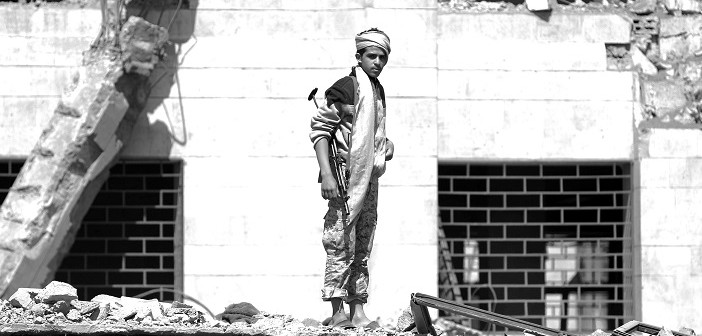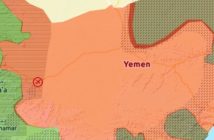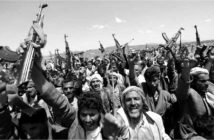Uncertainty and bleak times ahead…
Yemen has been overwhelmed by scorching civil war further fanned with Arab military intervention led by Saudi-Arabia since March 26, 2015. While the impoverished country has long been struggling with successive cycles of internal armed conflicts and political upheavals, Saudi-led intervention has just come to add insult to injuries. It has succeeded in foiling the Houthis-Saleh’s coup d’état, but it has been unable to re-instate the legitimate government, let alone to substantially empower it so as to bring the nation back to the right path.
Tailor-Made Military Operation
The coalition’s military operation has lagged far behind and it appears to be designed to neutralize Yemeni air forces, drive the putschist forces out of some governorates and prevent them from taking control over certain strategic cities and geographical areas, as well as imposing a no-fly-zone over Yemen and marine blockade to disrupt weapon supplies to the rebellious alliance.
The government troops and popular committee fighters could drive the Houthis-Saleh’s alliance troops and militias from Aden and other southern governorates as early as July 2015. They could prevent the putschist forces from taking control over the oil and gas-rich Marib governorate and the strategic strait of Bab El-Mandab.
But the coalition has continued to refrain from providing the local resistance fighters in several governorates such as Taiz, Al-Baidha and Hodeida with the necessary military assistance to drive the Houthis-Saleh’s alliance forces out of these regions. Moreover, the government’s troops and security services have continued to complain about shortages of military equipments, sophisticated weapons and finances. Hadi’s government has proved incapable to secure Aden city and re-establish security there simply because it hasn’t yet received the needed military, security and financial support.
Ironically, the Saudi-led coalition could drive Al-Qaeda’s militants out of Hudramout, the largest governorate in the country, within less than 72 hours, whereas this powerful coalition has been unable to secure the seaport city of Aden where terrorist groups have continued to carry out their terrorist operations regularly. It is not a matter of capacities; rather it is a plan and political will.
The Coalition’s Mission Finished
The Spokesman of the Saudi-led coalition General Ahmed Al-Asiri announced as early as April 2016 that major military operations have almost finished. And recently, UAE’s Minister of State for Foreign Affairs stated that their troops’ war in Yemen have ended. The fact is that the coalition’s military intervention has actually achieved its essential objectives, most importantly:
The Iranians have been denied footholds in Yemen for decades to come, particularly after they had failed their Yemeni allies.
The GCC’s air forces have successfully finished their joint military exercises. Scores of Gulf states pilots have developed their combating skills after killing thousands of Yemeni children, women and civilians. Now they can go to fight any battle elsewhere, with full self- confidence. They are no longer inexperienced.
The Saudi leadership’s short and long term objectives have been realized. The military campaign in Yemen has ensured Saudi Arabia a leading role in Arab politics. Every government and political force in the region will think twice before challenging Al-Saud. The Saudi royal dynasty also has been reassured that Yemen has been weakened for several decades. It is to His Majesty, King Salman’s credit that he strictly acted on King Abdulaziz’ recommendation: “Keep Yemen weak”, to prosper, and to be secure.
The young ambitious Amir, Mohammed Bin Sulman, deputy crown prince, has really made a great debut, proved incredible leadership skills and effectively made his way to the throne, thanks to Yemen’s military campaign.
The Saudi involvement in the Yemeni civil war illustrated that there is no single regional or international power that is really willing to challenge Saudi Arabia. Likewise, Yemeni national forces and political leaders, including Al-Houthi and Saleh, are all very keen to come to reconciliation with the rich-oil neighbor. Yemeni leaders of different political stripes are fully aware that Saleh is still desperately seeking to continue his services to the Al-Saud royal dynasty. Equally, Abdelmalik Al-Houthi is ready to make more concessions than Saleh and Hadi in order to gain Saudi support.
The Saudi-intervention has given the Saudi leadership the final word in the way the conflict can be solved and when. Therefore, Saudi leadership alone can help the Yemeni people. It is up to King Salman and Prince Mohammed to get the mission finished. Of course, finally they will have to do that, but they are not in a hurry.
Managing Crisis
Obviously, the Saudi-leadership has opted for crisis management in Yemen rather than problem solving; particularly after they had managed to stop the Houthis’ attacks on their southern borders through cease-fire or truce agreement with the rebellious group. Containing Yemenis’ conflicts and troubles within Yemen’s boundaries has long been a Saudi strategy.
However, this is the most destructive alternative for Yemeni people. A protracted violent conflict has seriously exacerbated Yemen’s multiple chronic problems and will have unbearable consequences upon the country’s national unity, economy, stability and social fabric of Yemeni society. Some irremediable effects have already been felt clearly in different walks of life.
Yemen now officially failed state
The worst case scenario Yemen has been facing is being a failed state. Such an alarming nightmare has become a reality. Everybody can imagine what horrible challenges Yemenis will have to face once the fragile regime’s features totally disappear; in a populous country with limited resources, rigid terrains, tribal nature, vested with arms and extremist and terrorist religious groups.
In the northern regions a radical sectarian group has been asserting its control. In the meantime, extremist and terrorist religious groups are strengthening their presence in the southern governorates. Since the beginning of the current civil war tens of thousands of young Yemeni people have lost their jobs. Then they have only three choices: to join the Al-Houthi militant organization or Al-Qaeda, or ISIS.
The ongoing civil war has provided the extremist and terrorist groups ideal recruiting conditions. Al-Qaeda and ISIS affiliates joined the local resistance committees in the southern governorates. Therefore, they could operate freely, recruiting hundreds of young men, promoting the Jihadist views and amassing a great deal of weapons and ammunition. As well as developing their fighting skills and capacities.
Economically, the prolonged armed conflict has brought Yemen’s national economy into the brink of total collapse. The reserves have fallen to around $1.1 billion from $4.7 billion at the end of 2014. The IMF put them at well below two months of imports, which it told Reuters was “very, very low”.
Against this background, Yemenis have only to brace themselves for more troubles and difficult times to come.





1 Comment
Well, thank you for the Analysis but let me tell you that it’s not based on updated information … the war in the Saudi borders is not finished yet, Houthis are gaining more ground in Yemen with more international support. Saudis and other GCC has lost interest in any other regional war as they learnt a hard lesson (war cost money).
it’s too late to say Yemen is failed state because there is not state now .. but statelets
anyway i advice to get this nice piece updated